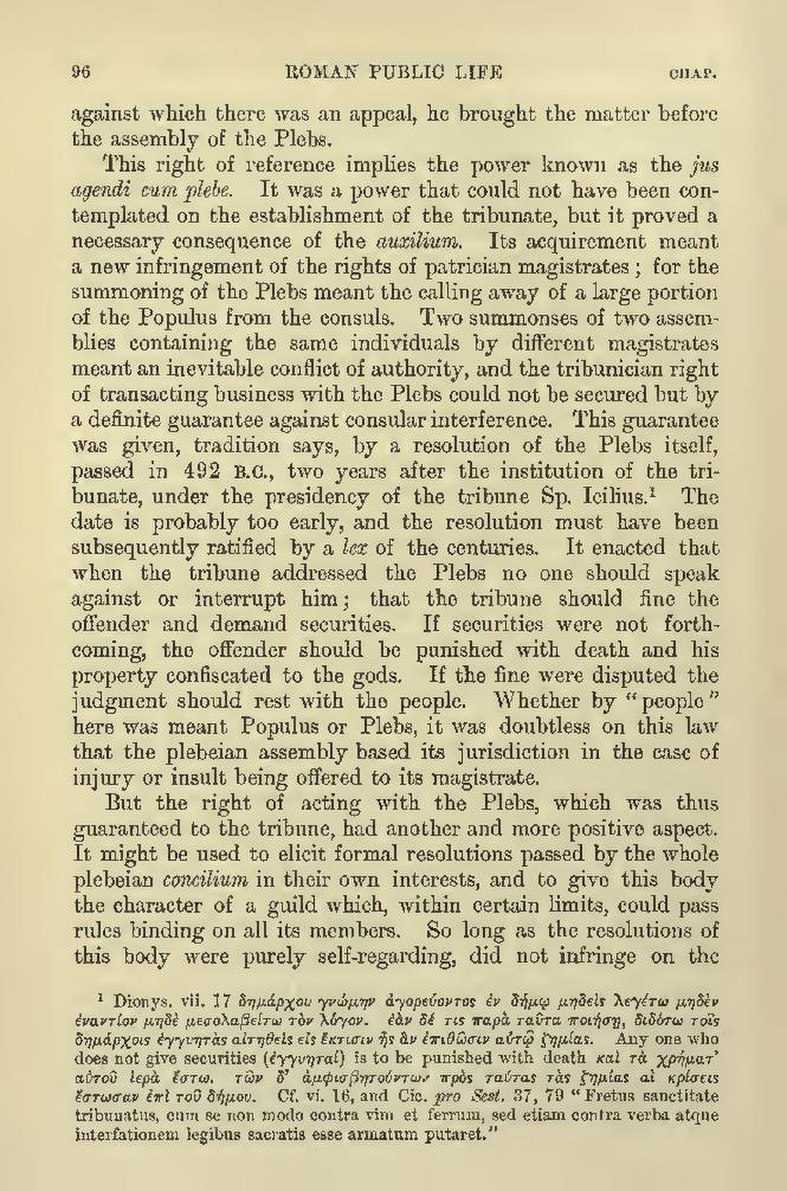against which there was an appeal, he brought the matter before the assembly of the Plebs.
This right of reference implies the power known as the jus agendi cum plebe. It was a power that could not have been contemplated on the establishment of the tribunate, but it proved a necessary consequence of the auxilium. Its acquirement meant a new infringement of the rights of patrician magistrates; for the summoning of the Plebs meant the calling away of a large portion of the Populus from the consuls. Two summonses of two assemblies containing the same individuals by different magistrates meant an inevitable conflict of authority, and the tribunician right of transacting business with the Plebs could not be secured but by a definite guarantee against consular interference. This guarantee was given, tradition says, by a resolution of the Plebs itself, passed in 492 B.C., two years after the institution of the tribunate, under the presidency of the tribune Sp. Icilius.[1] The date is probably too early, and the resolution must have been subsequently ratified by a lex of the centuries. It enacted that when the tribune addressed the Plebs no one should speak against or interrupt him; that the tribune should fine the offender and demand securities. If securities were not forthcoming, the offender should be punished with death and his property confiscated to the gods. If the fine were disputed the judgment should rest with the people. Whether by "people" here was meant Populus or Plebs, it was doubtless on this law that the plebeian assembly based its jurisdiction in the case of injury or insult being offered to its magistrate.
But the right of acting with the Plebs, which was thus guaranteed to the tribune, had another and more positive aspect. It might be used to elicit formal resolutions passed by the whole plebeian concilium in their own interests, and to give this body the character of a guild which, within certain limits, could pass rules binding on all its members. So long as the resolutions of this body were purely self-regarding, did not infringe on theAny one who does not give securities ([Greek: engyêtai]) is to be punished with death [Greek: kai ta chrêmat' autou hiera estô. tôn d' amphisbêtountôn pros tautas tas zêmias hai kriseis estôsan epi tou dêmou]. Cf. vi. 16, and Cic. pro Sest. 37, 79 "Fretus sanctitate tribunatus, cum se non modo contra vim et ferrum, sed etiam contra verba atque interfationem legibus sacratis esse armatum putaret."]
- ↑ Dionys. vii. 17 [Greek: dêmarchou gnômên agoreuontos en dêmô mêdeis legetô mêden enantion mêde mesolabeitô ton logon. ean de tis para tauta poiêsê, didotô tois dêmarchois engyêtas aitêtheis eis ektisin hês an epithôsin autô zêmias.
